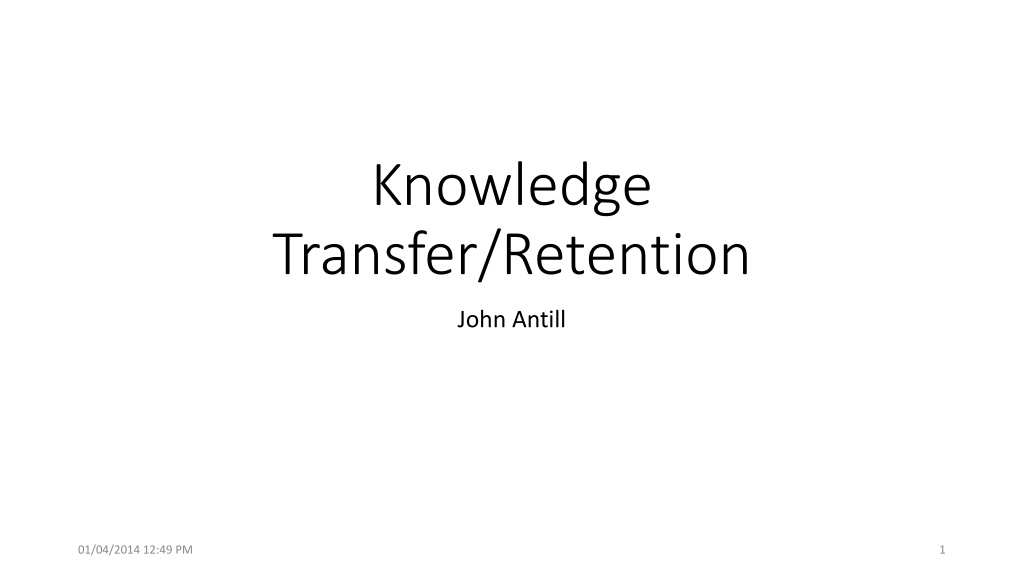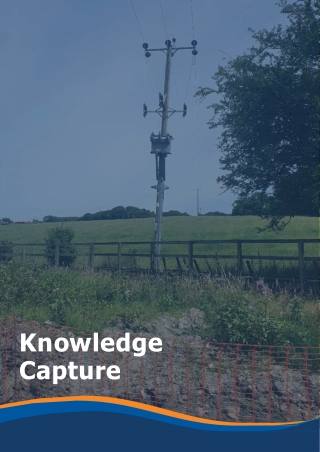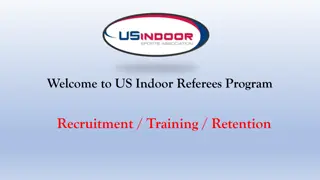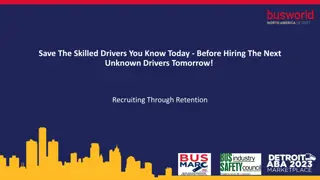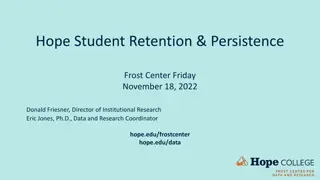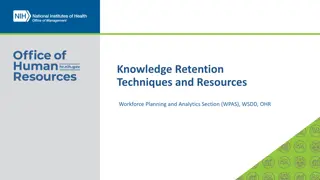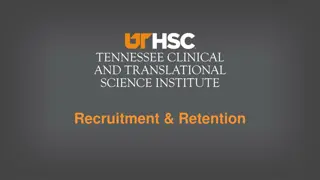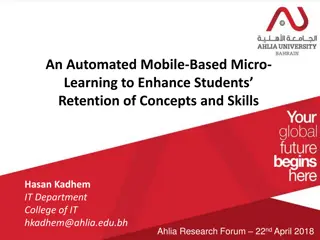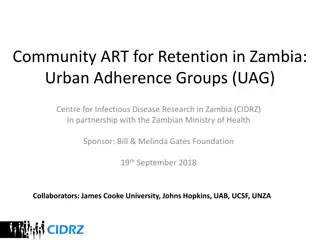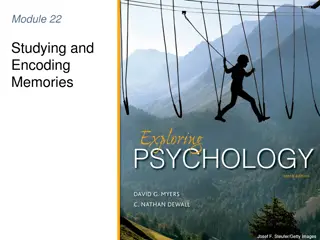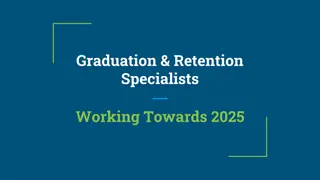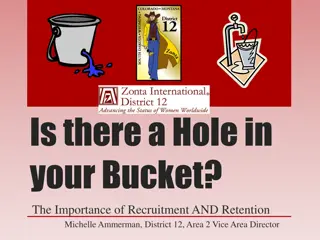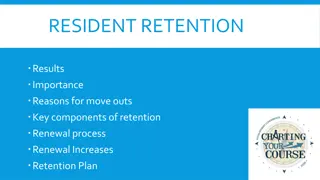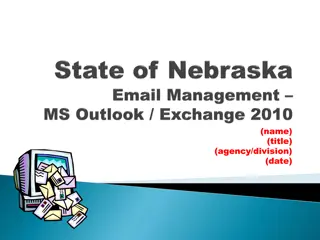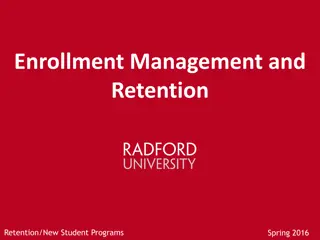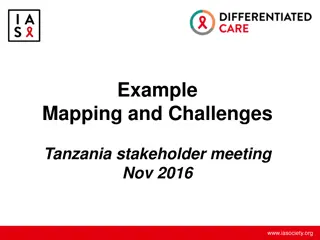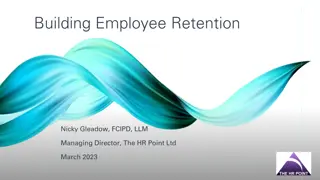Importance of Knowledge Retention in Organizations
Organizations face negative impacts on performance due to the loss of knowledge. Strategies such as exit interviews, mentorship, and knowledge sharing tools are vital for effective knowledge retention. Assessing knowledge retention maturity through various techniques is crucial, aligning with ISO standards.
Download Presentation

Please find below an Image/Link to download the presentation.
The content on the website is provided AS IS for your information and personal use only. It may not be sold, licensed, or shared on other websites without obtaining consent from the author. Download presentation by click this link. If you encounter any issues during the download, it is possible that the publisher has removed the file from their server.
E N D
Presentation Transcript
Knowledge Transfer/Retention John Antill 01/04/2014 12:49 PM 1
Why should we care about the loss of knowledge in our organizations? loss of knowledge Experience shows the negative impact on , the Organizations performance
Knowledge Retention Overview How do you do knowledge retention? (looking at tacit, implicit and explicit ways of retaining) Techniques: Exit interviews Mentor/prot g Yellow pages Profiles Videos And many more Process: Knowledge Jam 4 step KR process KMAP Appreciative Inquiry Knowledge Caf And many more Tools: Templates Databases Lessons learned Apps Websites And many more How do you assess maturity of your knowledge retention? Through 9 areas to Knowledge Retention, in alignment with ISO 30401:2018 Focus groups with people involved in KR Interviews with key stakeholders Know where KR is led (role, function, level) Observation is KEY: The questions are established as reference if focus groups are to be established - best let groups talk and understand responses without directly asking The questionnaire serves only as reference / guide and it does not require to be followed in detail Knowledge Management, Knowledge Transfer and Knowledge Retention
Knowledge Transfer/Retention Why is this an issue Why is this an issue $180,000 and 2 years for a middle level person on average $180,000 and 2 years for a middle level person on average What are we looking to transfer? What are we looking to transfer? Important Important Critical Critical Mission essential Mission essential Focus Area Focus Area Person Person Role Role Task/Capability Task/Capability 01/04/2014 12:49 PM 4
Type of Loss Terminations 2% Terminations 2% Transfer 36% Transfer 36% Retirements 43% Retirements 43% Quit 17% Quit 17% Death 2% Death 2% Loss Type Terminations Transfer Retirements Quit Death 01/04/2014 12:49 PM 6
Continue Working with the Organization Within 1 year 23% Within 1 year 23% Retire next year 2% Retire next year 2% 1 1- -3 years 23% 3 years 23% 3 3- -5 years 15% 5 years 15% 5 5- -10 years 19% 10 years 19% 10 or more 18% 10 or more 18% Working for Org < 1 Year Retire Next Year 1-3 Years 3-5 Years 5-10 Years <10 years 01/04/2014 12:49 PM 7
Ways to Transfer/Retain Knowledge Open Space Technology (OST) Open Space Technology (OST) Rapid Solution Design (RSD) Rapid Solution Design (RSD) Workout Workout Wikithon Wikithon After Action Review After Action Review Appreciative Inquiry Appreciative Inquiry World Caf World Caf KM Action Planning (KMAP) KM Action Planning (KMAP) Knowledge Jam Knowledge Jam Knowledge Retention Process Knowledge Retention Process Master Class Master Class Observation, Practice, Partnering and Observation, Practice, Partnering and taking responsibility (OPPTY) taking responsibility (OPPTY) Turn Over Binders Turn Over Binders Exit Interviews Exit Interviews 01/04/2014 12:49 PM 8
How to Identify the Areas/Person Bucky Balls Bucky Balls Capability Heat Map Capability Heat Map Diversity Risk Heat Map Diversity Risk Heat Map Critical Skill Critical Skill Retirement Risk Retirement Risk Flight Risk Flight Risk Aspiration Risk Aspiration Risk 01/04/2014 12:49 PM 9
Example of Bucky Balls and Heat Map 01/04/2014 12:49 PM 10
How to Judge Effectiveness (ROI) Replace Internal Low vs High Replace Internal Low vs High Replace External Replace External Do not replace Do not replace Productivity Productivity Overworked remaining staff Overworked remaining staff Lost knowledge Lost knowledge Training Training Bonus Bonus Interviewing Interviewing Recruiters Recruiters Cost Avoidance versus Cost savings Cost Avoidance versus Cost savings 01/04/2014 12:49 PM 11
